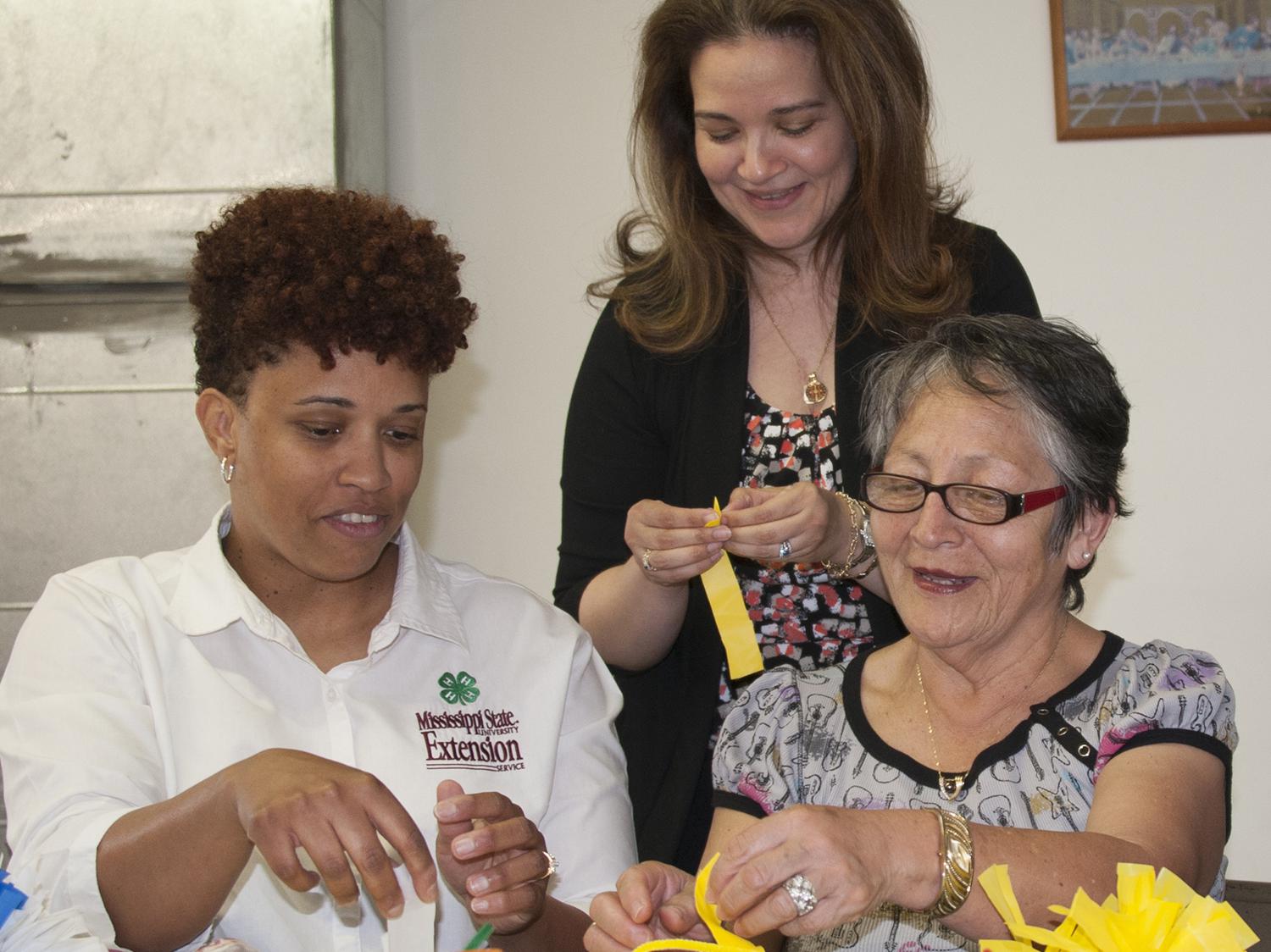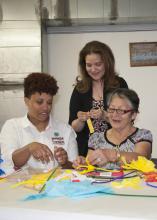Information Possibly Outdated
The information presented on this page was originally released on November 3, 2016. It may not be outdated, but please search our site for more current information. If you plan to quote or reference this information in a publication, please check with the Extension specialist or author before proceeding.
Extension programs reach Hispanic clients on the Coast
BILOXI, Miss. -- When Mississippi State University Extension Service agent Kim Gowdy began teaching parenting skills classes to Hispanic immigrants, she had just one challenge: Gowdy does not speak Spanish.
"My audience for these classes is all Spanish-speaking women," said Gowdy, who is based in the Harrison County Extension office. "I have an interpreter who translates for me, and when I have presentations, she will make the slides in Spanish, and then translate what I say."
Xenia Wickline, a community advocate with El Pueblo in Biloxi, directs the Mujeres Unidas (Women United) program, which includes Gowdy's audience.
“I was trying to build a program for these ladies to offer support and help make them independent,” Wickline said. “When Kim came to us and told me what she could offer, we just clicked. Now, we’ve been working together almost 5 years.”
Mujeres Unidas is a community organization that helps immigrants overcome barriers such as language, culture and isolation. The women come from nearly all the Spanish-speaking countries south of the U.S. border, and most of them have endured extreme hardship.
“People in our group have come to the U.S. walking through the desert, some have survived human trafficking and many are victims of domestic abuse,” Wickline said. “Most of the ladies are both mom and dad to their children, and some deal with deported husbands or family members.”
Gowdy’s classes, which are usually held twice a month, meet at St. Paul United Methodist Church in Biloxi. Topics include parenting, stress management, financial literacy, nutrition and sewing.
“In the sewing class, we made shopping buggy covers,” Gowdy said. “Most of them can’t speak English and didn’t know how to use a sewing machine.”
Despite these obvious challenges, Wickline never has a shortage of participants in the yearlong program.
“One reason the ladies like this group is because the time is for them,” Wickline said. “They feel like they are free to talk about everything with us, so we laugh and cry together.”
Women who participate in the program have not had many educational opportunities in the past, so classes are designed to meet some of their basic needs for knowledge.
“One lady had a son who was bullied in class, but she didn’t know her son was a victim of bullying,” Wickline said. “She found out using a technique that Kim taught, and she was able to go to her son’s teacher, and now her son is better.”
Another woman learned that emotional abuse is part of domestic abuse.
Sessions are tailored to meet the needs of each class of women, and a graduation ceremony wraps up the program.
“Those who attend the most classes are selected as valedictorian and salutatorian,” Gowdy said. “We have a real graduation ceremony with caps and gowns and diplomas, and we invite their families and friends to attend.
“The valedictorian and salutatorian have to give speeches,” she said. “Many of them have never graduated high school, so this program is an opportunity for them to graduate and feel that accomplishment. When they’re giving their speeches, I have no idea what they’re saying, but I’m so moved, I feel like crying with them.”
Wickline said the women regularly talk about how the classes have impacted their lives.
Fabiola Morales, a current class member from Mexico, has lived for a year and a half in Gulfport. Her husband’s job in Pascagoula brought them to the Gulf Coast. Morales heard about Mujeres Unidas when she went to El Pueblo for help getting a student visa for her son.
“I have support in the group Mujeres Unidas,” Morales said. “I feel good when I go there and talk about my problems. Sometimes you need to talk to somebody who speaks your own language. We do many things. I have fun, and they help me.”
Rosa Bender, originally from Peru, has lived in the U.S. for more than 30 years, the last 11 of which were in Biloxi. She has participated with Mujeres Unidas for more than a year.
“I am 55 years old,” Bender said. “My kids are grown and married, and I have seven grandkids and one great-granddaughter. I lost my husband about 5 years ago. When I feel terrible about my aloneness, I visit them. I made friends, and Kim is so sweet -- such a nice and kind person. That is why I still go over there.”
Gowdy won an Extension Award for Customer Outreach in 2015 for her work with Mujeres Unidas, and she enjoys the ongoing interaction with these clients.
“Some women repeat the program, but there are always new ones coming in,” Gowdy said. “To see these women come out of their shells and feel more comfortable is an accomplishment for me.”




